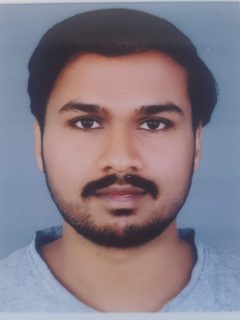Jadhav, Deepak Balasaheb
Deepak Balasaheb Jadhav, M. Sc.
- 2014 – 2018 B.Eng. in Mechanical Engineering, Savitribai Phule Pune University, Pune, India
- 2019 – 2022 M.Sc. in Computational Mechanics, University of Duisburg-Essen
- 2022 – doctoral candidate, Institute of Applied Dynamics, Friedrich-Alexander Universität Erlangen-Nürnberg
reviewed journal publications
2025
- , , , , :
A New Approach to Asynchronous Variational Integrators for a Phase Field Model of Dynamic Fracture
In: International Journal for Numerical Methods in Engineering (2025)
ISSN: 0029-5981
DOI: 10.1002/nme.70025
2023
- , , , , :
Extension of the spatially adaptive phase-field model to various forms of fracture
In: Forces in Mechanics 10 (2023), Article No.: 100161
ISSN: 2666-3597
DOI: 10.1016/j.finmec.2022.100161
conferences and proceedings
2025
- , , , , :
Computational efficiency of dynamic phase field fracture simulations using a new asynchronous variational integrator
conference, GAMM PF 25 and Materials/Microstructure modelling: Analytics & Benchmarks (Karlsruhe, 2025-02-12 - 2025-02-14)
2024
- , , , , :
A spatially adaptive phase field model for static and dynamic fracture
conference, IUTAM Symposium Computational Fracture Mechanics in Multi- Field Problems (Bad Honnef, 2024-12-08 - 2024-12-13) - , , , , :
Simulating Dynamic Phase Field Fracture using a New Asynchronous Variational Integrator
conference, 10th FRASCAL seminar (Erlangen, 2024-10-25) - , , , :
Phase Field Modeling of Dynamic Fracture using a Modified Asynchronous Variational Integrator
conference, European Conference on Fracture 2024 (Zagreb, 2024-08-26 - 2024-08-30)
2023
- , :
Asynchronous Variational Integrators for Elastodynamics and for a Phase Field Model of Dynamic Fracture
conference, 3rd RTG Retreat (Bad Staffelstein, 2023-11-17 - 2023-11-18) - , , :
Numerical illustration of Γ-convergence for variational integrators
conference, 8th FRASCAL seminar (Erlangen, 2023-04-28) - , , , , :
Investigation of different forms of fracture using a spatially adaptive phase-field model
conference, 8th GAMM Workshop on Phase-field modeling (ETH Zürich, 2023-02-06 - 2023-02-07) - , , , , , , :
Etablierung eines Finite-Elemente-Modells zur Darstellung des Patienten-spezifischen Risikos für osteoporotische Frakturen des Sakrums während Alltagsaktivitäten
conference, Deutscher Kongress für Orthopädie und Unfallchirurgie (Berlin, 2023-10-24 - 2023-10-27)
2022
- , , :
Finite Element Modeling of Osteoporotic Pelvic Ring and Extension of Project P9 into temporal adaptivity
conference, 2nd RTG Retreat of FRASCAL (Bad Windsheim, 2022-05-05 - 2022-05-06)
further publications
-
Teilprojekt P9 - Adaptive Dynamic Fracture Simulation
(Third Party Funds Group – Sub project)
Overall project: Fracture across Scales: Integrating Mechanics, Materials Science, Mathematics, Chemistry, and Physics (FRASCAL)
Term: 2019-01-02 - 2027-12-31
Funding source: DFG / Graduiertenkolleg (GRK)
URL: https://www.frascal.research.fau.eu/home/research/p-9-adaptive-dynamic-fracture-simulation/In the simulation of continuum mechanical problems of materials with heterogeneities caused e.g. by a grained structure on a smaller scale compared to the overall dimension of the system, or by the propagation of discontinuities like cracks, the spatial meshes for finite element simulations are typically consisting of coarse elements to save computational costs in regions where less deformation is expected, as well as finely discretised areas to be able to resolve discontinuities and small scale phenomena in an accurate way. For transient problems, spatial mesh adaption has been the topic of intensive research and many strategies are available, which refine or coarsen the spatial mesh according to different criteria. However, the standard is to use the same time step for all degrees of freedom and adaptive time step controls are usually applied to the complete system.
The aim of this project is to investigate the kinetics of heterogeneous, e.g. cracked material, in several steps by developing suitable combinations of spatial and temporal mesh adaption strategies.

